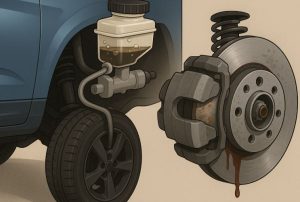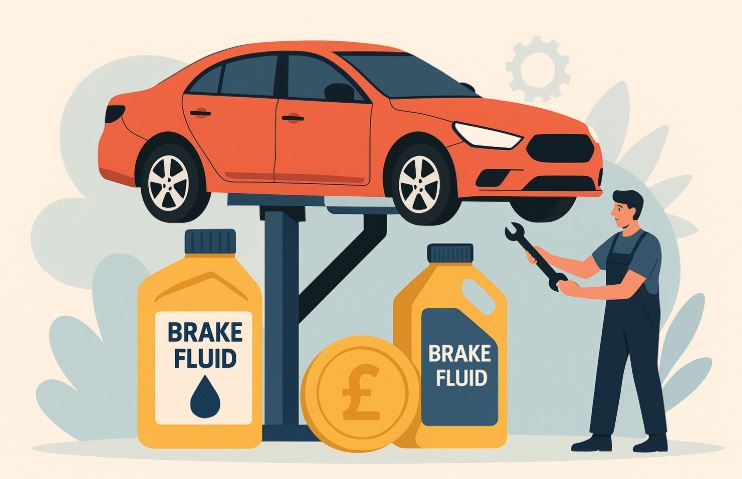If you’ve ever had that moment of uncertainty when your brakes don’t feel quite right, you’re not alone. For many UK drivers, brake fluid is one of those mysterious car maintenance needs that often gets overlooked, until something goes wrong.
In 2025, the cost of a brake fluid change in the UK has become more transparent, but still varies depending on your location, car model, and garage of choice.
Whether you’re planning ahead or facing an urgent replacement, knowing the average brake fluid change cost can help you budget better and keep your car in top condition.
This guide will walk you through the full picture, from typical prices and timelines to when and why brake fluid needs changing. Let’s dive into everything UK drivers need to know in 2025.
How Much Does a Brake Fluid Change Cost in the UK?

In 2025, the average brake fluid change cost in the UK is around £50, but this can range between £40 to £90. The variation comes down to the type of vehicle, the garage’s hourly rate, and the region you’re in.
While some garages offer fixed prices for standard vehicles, premium or performance models often cost more due to more complex braking systems.
Additional Cost Considerations
- Brake Inspection: Often included or available at a reduced rate if done together with fluid change.
- Labour Costs: Depending on the garage, hourly labour charges may raise the total bill.
- Car Repair Finance: Some garages now offer interest-free payment plans.
Typical Brake Fluid Change Cost in 2025
| Car Type | Cost Range (£) |
| Standard Hatchback | £40 – £60 |
| Mid-size Saloon | £50 – £75 |
| SUV or 4×4 | £60 – £90 |
| Performance Car | £70 – £100+ |
If you’re having your brakes checked during the appointment, it usually doesn’t increase the cost much, and it’s strongly recommended for safety reasons.
Is Brake Fluid Replacement Included in Routine Car Servicing?
Many drivers are surprised to learn that a brake fluid change isn’t always included in routine car servicing. Even though it’s a critical aspect of vehicle safety, this service is frequently considered additional maintenance and might need to be requested separately.
Why It’s Often Missed?
Modern vehicles can go longer between full services, but brake fluid still degrades over time. Garages may focus on oil, filters, and tyres during routine checks, unintentionally sidelining fluid health unless specified.
Recommendations
- Ask your garage specifically about brake fluid during regular servicing.
- Check your vehicle’s service booklet to confirm if it includes hydraulic fluid checks.
Skipping this maintenance task may seem minor, but it can lead to serious braking issues if the fluid becomes too old or contaminated.
Why Does Brake Fluid Need Changing Every Two Years?

Brake fluid doesn’t last forever. In fact, manufacturers and mechanics generally recommend changing it every 24 months or 20,000 miles, whichever comes first.
Over time, brake fluid attracts moisture from the atmosphere, reducing its boiling point and its ability to effectively transmit pressure.
How Fluid Deteriorates?
- Absorbs Moisture: Leads to internal corrosion of brake lines and components.
- Contaminants Build Up: Rust, dirt, and other particles reduce effectiveness.
- Air Bubbles: Air in the system reduces the braking force.
Changing it regularly ensures optimal braking performance and prevents long-term damage to your vehicle’s hydraulic system.
How Does Brake Fluid Change Cost Vary by Car Model?
Your car’s make and model play a major role in the final cost of a brake fluid change. Some models, especially those with advanced braking systems or larger fluid capacities, may incur higher charges due to the extra labour or materials required.
Car Model Cost Differences
| Car Model Type | Estimated Brake Fluid Change Cost (£) |
| Ford Fiesta / Vauxhall Corsa | £40 – £60 |
| Audi A4 / BMW 3 Series | £60 – £85 |
| Range Rover / Mercedes GLC | £70 – £100+ |
Luxury or imported vehicles may also use premium brake fluids, increasing the material cost. Always confirm with your local garage whether your model requires DOT 3, DOT 4, or synthetic fluid.
Are Garage Prices for Brake Fluid Change Higher in Major Cities?
Absolutely. In larger UK cities, the brake fluid change cost can be significantly higher due to labour rates, operating expenses, and regional market trends.
Regional Cost Breakdown
| City | Labour Cost Estimate (£) | Brake Fluid Change Cost (£) |
| London | 150 – 250 | 50 – 70 |
| Birmingham | 130 – 200 | 45 – 65 |
| Manchester | 120 – 190 | 40 – 60 |
| Glasgow | 110 – 180 | 40 – 60 |
| Bristol | 125 – 210 | 45 – 65 |
| Leeds | 115 – 185 | 40 – 60 |
| Newcastle | 120 – 195 | 40 – 60 |
| Sheffield | 110 – 175 | 40 – 60 |
Living in or near a large city may mean higher costs, but many garages now offer online quotes and competitive pricing tools. It’s worth checking local comparisons.
What’s the Average Labour Charge for a Brake Fluid Change in 2025?

The labour component of a brake fluid change in 2025 often ranges from £30 to £70, depending on your location and the type of garage. Dealerships and national chains may charge more, but they typically include full diagnostics and guarantee the work.
What Affects Labour Costs?
- Vehicle Complexity: Larger or high-performance cars take longer.
- Garage Reputation: Specialist garages may charge premium rates.
- Location: As previously noted, cities cost more than rural areas.
Labour costs usually account for half or more of the total bill. Checking the breakdown before booking can help avoid surprises.
Can You Change Brake Fluid Yourself to Save on Costs?
While it might seem like a straightforward task, changing brake fluid at home isn’t recommended unless you’re highly experienced with car maintenance.
Working on brakes involves safety-critical systems, and improper bleeding or incorrect fluid can lead to serious accidents.
Risks of DIY Brake Fluid Replacement
- Potential air bubbles in brake lines
- Using the wrong fluid type
- Damage to components due to spillage
- Personal injury or faulty braking
Most garages complete this job within an hour and ensure that your braking system is working properly. Considering the importance of safety, paying a professional is usually the smarter choice.
How Long Does a Brake Fluid Change Usually Take?
On average, a brake fluid change takes between 30 to 60 minutes at most garages in the UK. The time may vary slightly based on vehicle type and whether additional brake checks or top-ups are included.
What Might Extend the Time?
- Flushing older systems that haven’t been serviced in years
- Dealing with stuck reservoir caps or corroded parts
- Bundling with other brake services like pad replacements
Mechanics typically inspect the system, drain the old fluid, flush the lines, and refill with fresh fluid, followed by a test drive or pressure check.
What Happens If You Don’t Replace Brake Fluid On Time?

Delaying or skipping brake fluid replacement can lead to decreased braking power, potential failure, and increased wear on your braking system. Over time, contaminated fluid can cause internal corrosion, clog lines, and degrade seals.
Common Issues from Neglect
- Brake fade when the fluid overheats
- Reduced stopping power
- Costly damage to ABS modules and callipers
- Moisture-related corrosion inside the brake system
Timely replacement isn’t just a service checklist item—it’s a safety necessity.
How to Know When It’s Time for a Brake Fluid Change?
While most experts suggest every two years, your car may give signs it needs a change sooner. Regular inspections during fluid checks can help you catch problems early.
Key Indicators to Watch
- Fluid appears dark or murky
- Brake pedal feels soft or spongy
- ABS warning light activates
- Longer braking distances
Visual Inspection Tips
- Brake fluid should be light golden in colour, not black
- Reservoir should be sealed tightly to prevent moisture entry
- Avoid overfilling, as brake fluid is corrosive
If in doubt, ask your garage to test the fluid condition during your next visit.
Conclusion
In 2025, understanding the brake fluid change cost and the importance of this routine maintenance can go a long way in keeping your vehicle safe and roadworthy.
With costs ranging from £40 to £90 depending on your car and location, it’s a relatively small investment that protects one of your car’s most vital systems.
Whether you’re in London or Leeds, a brake fluid change doesn’t take long and can prevent expensive repairs down the road. Check your owner’s manual, consult your garage, and don’t ignore the warning signs.
Make brake fluid changes a regular part of your car care schedule, and your brakes will thank you every time you need to stop safely.
FAQs
How often should I change my brake fluid in the UK?
Most experts recommend changing your brake fluid every two years or 20,000 miles, whichever comes first.
Is brake fluid change part of an MOT?
No, brake fluid change is not part of an MOT, but the condition of your braking system is checked.
Can dirty brake fluid cause brake failure?
Yes, contaminated or moisture-filled brake fluid can reduce braking effectiveness and even lead to failure.
What does dark brake fluid indicate?
Dark brake fluid often signals oxidation, contamination, or old fluid that needs replacement.
Does brake fluid affect ABS systems?
Yes, poor fluid quality can affect the ABS system’s performance and responsiveness.
Are synthetic brake fluids better?
Synthetic brake fluids like DOT 4 or 5.1 offer higher boiling points but must be compatible with your vehicle.
Do electric cars need brake fluid changes?
Yes, even electric vehicles with regenerative braking systems require brake fluid maintenance.









